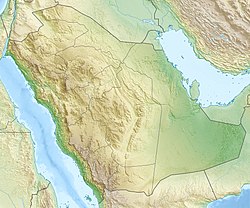Muzdalifah (Arabic: مُزْدَلِفَة) is an open and level area near Mecca in the Hejazi region of Saudi Arabia that is associated with the Ḥajj ("Pilgrimage").[1][2][3][4] It lies just southeast of Mina, on the route between Mina and Arafat.
Muzdalifah
مُزْدَلِفَة | |
|---|---|
| Coordinates: 21°23′33″N 39°56′16″E / 21.39250°N 39.93778°E | |
| Country | |
| Region | Makkah |
| Government | |
| • Regional Governor | Khalid bin Faisal Al Saud |
| Time zone | UTC+3 (Arabia Standard Time) |
In Pre-Islamic times the Hums being the Quraysh, Banu Kinanah, Banu Khuza'a and Banu 'Amir would camp at Muzdalifah and refuse to go to Mount Arafat with the other Arabs.[5]
With the coming of Islam, the Hums were reprimanded for this behaviour and told to depart with the other Arabs in Quran 2:199.
Pilgrimage
editThe stay at Muzdalifah is preceded by a day at Mount Arafat, consisting of glorifying God, repeating the duʿāʾ (Supplication), repentance to God, and asking him for forgiveness. At Arafat, Ẓuhr and ʿAṣr prayers are performed in a combined and abbreviated form during the time of Zuhr. After sunset on the ninth day of the Islamic month of Dhūl-Ḥijjah, Muslim pilgrims travel to Muzdalifah, sometimes arriving at night because of over-crowding. After arriving at Muzdalifah, pilgrims pray the Maghrib and ʿIshāʾ prayers jointly, whereas the Isha prayer is shortened to 2 rakats. At Muzdalifah, pilgrims collect pebbles for the Stoning of the Devil (Arabic: رَمِي ٱلْجَمَرَات, romanized: Ramī al-Jamarāt, lit. 'Stoning of the Place of Pebbles').[6][7][8]
The Sacred Monument
edit| The Sacred Grove | |
|---|---|
Al-Mashʿar Al-Ḥarām (ٱلْمَشْعَر ٱلْحَرَام) | |
| Religion | |
| Affiliation | Islam |
| Province | Makkah |
| Region | Hejaz |
| Deity | Allah (God) |
| Rite | Hajj |
| Status | Active |
| Location | |
| Location | Muzdalifah |
| Country | Saudi Arabia |
| Administration | Saudi government |
| Geographic coordinates | 21°23′10″N 39°54′44″E / 21.38611°N 39.91222°E |
| Architecture | |
| Type | Mosque |
| Style | Islamic |
| Specifications | |
| Direction of façade | Qiblah |
| Minaret(s) | 2 |
The open-roofed mosque at Muzdalifah is known as "The Sacred Grove"[1][2][3][4] (Arabic: ٱلْمَشْعَر ٱلْحَرَام, romanized: Al-Mashʿar Al-Ḥarām).[9]
See also
editReferences
edit- ^ a b Long, David E. (1979). "2: The Rites of the Hajj". The Hajj Today: A Survey of the Contemporary Pilgrimage to Makkah. SUNY Press. pp. 11–24. ISBN 0-8739-5382-7.
With thousands of Hajjis, most of them in motor vehicles, rushing headlong for Muzdalifah [...] There is special grace for praying at the roofless mosque in Muzdalifah called al-Mash'ar al-Haram (the Sacred Grove)
- ^ a b Danarto (1989). A Javanese pilgrim in Mecca. p. 27. ISBN 0-8674-6939-0.
It was still dark when we arrived at Muzdalifah, four miles away. The Koran instructs us to spend the night at al-Mash'ar al-Haram. the Sacred Grove at Muzdalifah, as one of the conditions for the hajj.
- ^ a b Jones, Lindsay (2005). Encyclopedia of religion. Vol. 10. Macmillan Reference USA. p. 7159. ISBN 0-0286-5743-8.
The Qur'an admonishes: "When you hurry from Arafat, remember God at the Sacred Grove (al-mash' ar al-haram)," that is, at Muzdalifah (2:198). Today a mosque marks the place in Muzdalifah where pilgrims gather to perform the special saldt
- ^ a b Ziauddin Sardar; M. A. Zaki Badawi (1978). Hajj Studies. Jeddah: Croom Helm for Hajj Research Centre; King Abdul Aziz University. p. 32. ISBN 0-8566-4681-4.
Muzdalifah is an open plain sheltered by parched hills with sparse growth of thorn bushes. The pilgrims spend a night under the open sky of the roofless Mosque, the Sacred Grove, Al Mush'ar al-Haram. On the morning of the tenth, all depart[.]
- ^ https://sunnah.com/bukhari:4520
- ^ Burton, Richard Francis (1857). Personal Narrative of a Pilgrimage to El Medinah and Meccah. p. 226.
The word jamrah is applied to the place of stoning, as well as to the stones.
- ^ Abū Dā'ūd (1984). Sunan Abu Dawud: Chapters 519-1337. Sh. M. Ashraf. ISBN 978-9-6943-2097-7.
1204. Jamrah originally means a pebble. It is applied to the heap of stones or a pillar.
- ^ Hughes, Thomas Patrick (1995) [1885]. Dictionary of Islam. Asian Educational Services. p. 225. ISBN 978-81-206-0672-2.
Literally "gravel, or small pebbles." The three pillars [...] placed against a rough wall of stones [...]
- ^ Quran 2:129 (Translated by Yusuf Ali)


